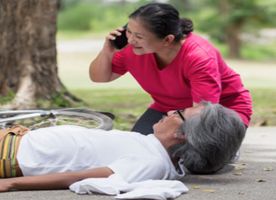Neurology in Chiang Mai
Search and Compare the Best Clinics and Doctors at the Lowest Prices for Neurology in Chiang Mai












































































































































No Time?
Tell us what you're looking for and we'll reach out to the top clinics all at once
Neurology is a branch of medicine that focuses on the diagnosis and the treatment of diseases of the nervous system. The nervous system is a complex and sophisticated system that regulates and coordinates our body activities. It is divided into two major parts:
- The central nervous system: the brain and spinal cord
- The peripheral nervous system: all nerves branching out from the brain and spinal cord, and extend to other parts of the body, including organs and muscles.
Since the nervous system is complex, there are numerous subspecialties within the field of neurology, including:
- Neurodevelopmental disabilities
- Pediatric or child neurology
- Neuromuscular medicine
- Pain medicine
- Hospice and palliative care neurology
- Headache medicine
- Vascular Neurology (stroke care)
- Sleep medicine
- Autonomic disorders
- Brain injury medicine
- Neuropsychiatry
- Epilepsy
- Neurointensive care
A doctor who specializes in treating diseases of the nervous system is called a neurologist. Symptoms that often require a neurologist help may include coordination problems, muscle weakness, confusion, dizziness, and a change in sensation. People who are having problems with their senses, such as vision, touch, or smell, may also require to see a neurologist since problems with senses are sometimes caused by disorders of the nervous system.
A neurologist may also treat patients with:
- Stroke
- Seizure disorders, such as epilepsy
- Migraines and headaches
- Brain aneurysms
- Brain tumors
- Peripheral neuropathy
- Multiple sclerosis
- Infections of the nervous systems, such as meningitis, encephalitis, or brain abscesses
- Neuromuscular disorders, such as myasthenia gravis
- Neurodegenerative disorders, such as Alzheimer’s disease and Lou Gehrig’s disease
- Sleep disorders
- Spinal cord disorders, such as autoimmune and inflammatory disorders
- Speech and language disorders
Keep in mind that neurologist does not perform surgery. If you need surgery, you will be referred to a neurosurgeon.
What does Neurology Involve?
A wide variety of different tests and procedures are used to diagnose and treat neurological conditions. On your first appointment with a neurologist, a physical and neurological exam is likely to be performed. A neurological exam is done to test muscle strength, coordination, and reflexes.
Because different diseases can have similar symptoms, more than one testing may be required for your neurologist to make a diagnosis.
Some of the procedures that fall into the field of neurology may include:
Electromyography
Electromyography (EMG) is used to measure how well your muscles react to electrical stimulation from motor neurons, which are specific nerves controlling muscle movement. It can help neurologists diagnose general muscle or nerve dysfunction, as well as spinal cord disease.
During an EMG, small needles called electrodes are inserted into the muscle by a specially trained technician. The electrodes can measure the different electrical activity occurring in muscle tissue during periods of movement and rest.
Electroencephalogram
Electroencephalogram (EEG) is performed to assess and record electrical activity in your brain. Neurons in our brain communicate with other neurons through electrical impulses, which an EEG can record. Brain wave patterns can also be tracked by an EEG. It is used to help diagnose conditions of the brain, including tumors, inflammation, injuries, as well as psychiatric disorders, epilepsy, and seizures.
During an EEG, electrodes are placed on your head. The electrodes are connected to a computer, which converts electrical signals into patterns that can be seen from a screen or printed on a piece of paper.
Lumbar puncture
Lumbar puncture is done to test your spinal fluid. It involves inserting a needle into your spine after numbing it with an anesthetic. Using the needle, a sample of your spinal fluid is taken.
A lumbar puncture can help diagnose the following conditions:
- Meningitis
- Encephalitis
- Leukemia
- Myelitis
- Dementia
- Autoimmune diseases, such as multiple sclerosis (MS)
- Bleeding in the brain
The procedure can also be used to treat conditions affecting the spinal cord. Your neurologist may inject anesthetics, cancer treatments, or antibiotics using a lumbar puncture needle.
Tensilon test
To help diagnose myasthenia gravis, your neurologist may perform a tensilon test. It involves the injection of a medicine called Tensilon. Then, your neurologist observes how medicine affects your muscle movements.
Sleep study
Chronic sleep problems are diagnosed in a Sleep Study. Also known as a Polysomnogram (PSG), this procedure involves monitoring patients during sleep and physiological data is recorded electronically.
Other tests
Other types of tests may be used by your neurologist to make a diagnosis. These may include:
- Magnetic resonance imaging (MRI scan)
- Computed tomography (CT scan)
- Positron emission tomography (PET scan)
- Biopsy
- Genetic testing
- Angiography
Botox injections
Botox injections can be done to treat some neurological conditions, such as cerebral palsy, that can cause your limbs to pull in toward your center. Sometimes, these contracted muscles can be relaxed with Botox injections.
Botox injections involve injecting tiny amounts of botulinum toxin into your skin of muscles using a thin needle.
Brain tumor treatment
A range of treatments can be done to treat a brain tumor. If your neurologist believes that you need surgery, you will be referred to a neurosurgeon who will remove as much of the brain tumor as possible through surgery.
A brain tumor may also be treated with radiation therapy, which uses high-energy beams to kill tumor cells.
Brain tumor treatment may be integrated between the departments of neurology and oncology.
Brain rehabilitation therapy
Brain rehabilitation therapy is used to help you relearn functions that are lost as a result of a brain injury. Brain rehabilitation therapy is usually integrated between specialty teams in the departments of neurology, sports medicine, psychiatry and psychology, neuroradiology, and the vestibular/balance laboratory.
Deep brain stimulation
During deep brain stimulation, electrodes are implanted within certain areas of the brain. The electrodes generate electrical impulses that can regulate abnormal impulses. These electrical impulses may also affect certain chemicals and cells within the brain.
Deep brain stimulation can be done to treat numerous conditions, including dystonia, essential tremor, epilepsy, and Parkinson’s disease. It is also being studied as a potential treatment for multiple sclerosis and stroke recovery.
Spinal stenosis treatment
Spinal stenosis is a condition that occurs when the spinal canal narrows and pinches the nerves, leading to back and leg pain. Spinal stenosis may be treated with pain medications, physical therapy, steroid injections, decompression procedure, or surgery. Surgery is usually performed if other treatments have not helped.
How Long Should I Stay in Chiang Mai?
Your length of stay depends on the type of procedure you have, you may be allowed to leave the hospital on the same day or you will stay for several days. For diagnostic procedures, you should be allowed to leave the hospital on the same day. However, you should wait until the results of the test are ready before you can fly home, which may take as long as 7 days, sometimes even longer. If you undergo brain tumor treatments or other types of treatment, especially treatments that involve surgical intervention, you should aim to stay in Chiang Mai at least for 10 days.
What's the Recovery Time?
The recovery time can be different for each procedure. It may also depend on the reason why you are having the procedure and your overall health. Your neurologist and neurosurgeon will give you a recovery timeline for each procedure. The recovery period for diagnostic procedures is typically short and you may be able to resume your normal activities within a week or so. For surgical procedures, you may need to wait 4 weeks or months until you can go back to your daily routine, including work and exercise.
What About Aftercare?
A detailed aftercare instruction will be given to you following your procedure. While the instructions will be different for each procedure, they typically include a diet plan, exercise, restrictions, and wound care (if any surgical intervention is involved). You should follow these instructions carefully in order to have a speedy and smooth recovery.
You may also need to attend follow-up checkups to monitor your overall condition and healing. For brain tumors, you may need to attend regular checkups to ensure the tumor has not come back.
What's the Success Rate?
The field of neurology is constantly advancing. The success rate of each procedure is typically high, particularly when performed by highly skilled and experienced medical professionals. Still, some procedures may carry some risks, such as bleeding, infection, and nerve injury.
Are there Alternatives to Neurology?
Since neurology is the branch of medicine to diagnose and treat problems of the nervous system, there are no other alternatives. However, if your doctor found that your disease or illness is found to be caused by other problems unrelated to the nervous system, your doctor will recommend you to see the relevant doctor.
This information has been accurately sourced and verified by a medical professional for its accuracy, however, we strongly recommend you to consult with your doctor before pursuing medical procedures overseas.






















